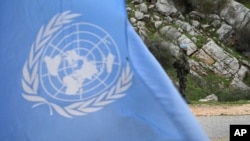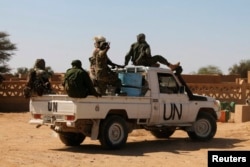The chair of the U.S. Senate Foreign Relations Committee threatened Wednesday to reduce funding to the United Nations over peacekeeper misconduct.
"What is wrong with the secretary-general of the U.N.?" Senator Bob Corker, a Tennessee Republican, asked a hearing on ending sexual abuse in U.N. peacekeeping. "I think the U.N. is in great jeopardy of building enough critical mass around here where severe penalties should be taken against them with withholding of funds from them because of their ineptness."
Corker and other senators are angry over the string of sexual abuse and misconduct allegations against both U.N. and non-U.N. military and police personnel, mostly in Africa.
The United States contributes about a quarter of the $8 billion annual U.N. peacekeeping budget. Several senators expressed their disapproval of continuing to send taxpayer dollars at that level if sexual abuse cases do not dramatically decrease.
Protectors as perpetrators
In a report last month, the U.N. acknowledged that allegations of sexual abuse rose in 2015, despite the institution's "zero tolerance" policy. Peacekeepers were implicated in 69 cases, while there were 30 allegations against civilian staff members. Many of their victims were children.
More than half the peacekeeper-related allegations were made against just two U.N. missions in the Central African Republic and the Democratic Republic of Congo.
"If I knew right now that a U.N. peacekeeping mission was going to go into North Chattanooga today, which is where my wife is," Corker said referring to his Tennessee neighborhood, "I would be on the first plane out of here to go home and protect her from the U.N. peacekeepers — especially if they came from certain countries."
New allegations
The U.N. has been implementing new tougher measures against accused peacekeepers, including sending at least two entire contingents of troops back home. Countries of implicated troops are now publicly "named and shamed," and the salaries of accused troops are withheld, in some cases to be added to a trust fund to support victims and the babies that often result from the rapes.
But despite these efforts, new allegations continue to surface. On Wednesday, advocacy group AIDS-Free World, which has been instrumental in bringing abuse allegations to light, said it had information about 41 additional cases of sexual abuse by peacekeepers in the Central African Republic.
U.N. spokesman Stephane Dujarric would not confirm that number, but said that he "would not be surprised" if the current reported number of cases "goes up a bit." He said the U.N. takes such allegations "very seriously" and is being "as meticulous as possible" in interviewing alleged victims.
The U.N. has more than 100,000 troops and police from 122 countries, working in 16 operations, most in very difficult and dangerous environments.





